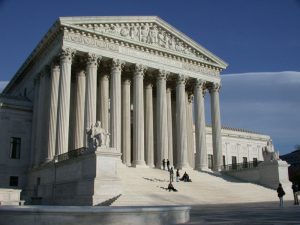 The U.S. Supreme Court will hear a case this fall about a baker who refused to bake a cake for a same-sex wedding.
The U.S. Supreme Court will hear a case this fall about a baker who refused to bake a cake for a same-sex wedding.
Jack Phillips, who owns Masterpiece Cakeshop in Lakewood, Colo., a suburb of Denver, claims the constitution gives him the right to practice his faith as he sees it without limitations. And if his religion tells him he can’t bake a cake for a black couple, I mean an interracial couple, I mean a Jewish couple damnit, I mean a same-sex couple, then he has the right not to bake the cake.
Under Colorado law, it is illegal to deny someone service because of race, gender, religion or sexual orientation among other categories.
Attorneys in Masterpiece Cakeshop v. Colorado Civil Rights Commission are expected to argue whether the Obergefell marriage equality decision was overly broad and whether there are still questions that need to be answered, according to CNN.
Phillips says that he decided when he opened the bakery in 1993, he didn’t want to bake certain types of cakes, like for Halloween, because that conflicts with his religious views.
When David Mullins and Charlie Craig, the couple getting married that approached Phillips to bake their cake, were in the shop, Phillips he told them he couldn’t bake a cake that contradicted God’s teachings, but offered to make any other baked products for them. That’s because God said thou shalt not bake a cake for a gay wedding, but cupcakes, brownies, cookies and rugelach are OK.
In Texas, the state Supreme Court ruled in June unanimously that married same-sex couples don’t have a right to equal benefits. They ruled that Obergefell didn’t relate to all marriage matters even though the decision is specific about benefits: “… same-sex couples are denied the constellation of benefits that the States have linked to marriage and are consigned to an instability many opposite-sex couples would find intolerable” and “marriage also confers more profound benefits.” And just to be clear, Justice Anthony Kennedy wrote in his opinion, “For that reason, just as a couple vows to support each other, so does society pledge to support the couple, offering symbolic recognition and material benefits to protect and nourish the union.”
